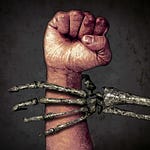Democratic debate and dialogue have all but vanished in the United States. There is widespread censorship imposed by social media platforms, private corporations about which we know nothing, while they know everything about us. Mainstream news outlets champion censorship and deplatforming in the name of democracy. Brian Seltzer, for example, on CNN justified banning Donald Trump form social media because, he said, “reducing a liar’s reach is not the same as censoring freedom of speech.” Sean Hannity on Fox News spent 40 minutes talking over former New York Mayor Bill de Blasio, the same tactic CNBC host Rick Santelli used to shut down debate about COVID-19. The impulse is to silence opponents rather than engage in dialogue and debate. This extreme polarization, as Steven Levitsky and Daniel Ziblatt write in How Democracies Die, is one of the primary signs of a dying democracy. Nolan Higdon, a lecturer at Merrill College and the Education Department at University of California, Santa Cruz and Mickey Huff, the director of Project Censored and president of the nonprofit Media Freedom Foundation, join me to discuss this dangerous inability to communication among antagonistic groups and their new book Let’s Agree to Disagree: A Critical Thinking Guide to Communication, Conflict Management, and Critical Media Literacy.
Share this post

The Chris Hedges Report Podcast with Mickey Huff & Nolan Higden about the dangerous bifurcation of the United States into antagonistic tribes that can no longer communicate
chrishedges.substack.com
1×
0:00
-30:53
The Chris Hedges Report Podcast with Mickey Huff & Nolan Higden about the dangerous bifurcation of the United States into antagonistic tribes that can no longer communicate
Jan 05, 2023
The Chris Hedges Report Podcast
Covering US foreign policy, economic realities, and civil liberties in American society.
Covering US foreign policy, economic realities, and civil liberties in American society. Listen on
Substack App
RSS Feed
Recent Episodes


















The Chris Hedges Report Podcast with Mickey Huff & Nolan Higden about the dangerous bifurcation of the United States into antagonistic tribes that can no longer communicate